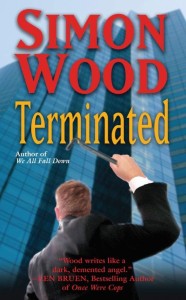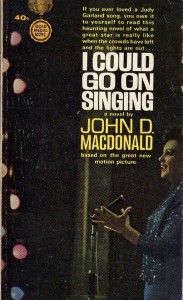Every author I know hates writing a synopsis. They hate having to try to boil down their beloved story into 2 – 3 double spaced pages. They agonize over it, moan about it in public, throw fits, start the occasional bar fight. They would rather run in front of the bulls at Pamplona, wearing clogs, than write a short overview of their novel.
But don’t buy your airline tickets to Spain just yet, because it’s really not that hard. If you’ll just follow these guidelines, you’ll always have a solid synopsis, one you can show to any agent or editor and leave them wanting more.
A good synopsis is what I call “back cover copy on steroids.” It’s intended to “sell the sizzle” and give just enough of the steak to create confidence in the project.
This is not the same thing as a detailed outline, or treatment, which is much more substantial. The synopsis is a selling document. So approach it that way from the outset.
Before You Write the Synopsis
Build a foundation. Start from the ground up, one brick at a time.
Your first brick is a one sentence summary of your book. If you can’t boil your book down into a single, compelling sentence, you are not ready to write it or sell it.
Second, expand that one sentence into back cover copy. That’s about 250 words of copy meant to sell your book to a harried consumer. You can easily learn to do this by getting books of similar genre from the library and reading the cover or dust jacket copy. Or read descriptions of such books on amazon.com. Read a lot of these, studying the form. Write your own back cover copy. Work it until you have something that would make a consumer want to buy the book.
Now you’re ready to write the synopsis.
The Parts of the Synopsis
1. The Opening paragraph
This tells us who the main character is, what he does (vocation), what he’s like. Then one line on what the character wants at the present moment. A day before the story opens, what is the character going for? Goals? Drives?
Every Lead needs the above things. This first paragraph sets up the rest of the synopsis. Here’s an example. (Note: The first time you introduce a character, use the full name and put it in ALL CAPS):
WALTER NEFF is a hotshot insurance salesman on the make for more business. He likes making money and having the occasional fling with women he makes house calls on. Even if they’re married.
2. Second paragraph
The Disturbance. (See my post on the subject). What is the incident that gets the story rolling?
One afternoon he calls on a client, and finds the client’s wife, delicious blonde PHYLLIS DEITRICHSON, wrapped in a revealing towel from sunbathing. She gets dressed and meets with him in the living room. During his pitch, Neff makes little comments about her looks and a game of sexual cat and mouse ensues. One thing for sure, when Walter Neff leaves the house he knows he’s gone overboard for Mrs. Phyllis Deitrichson.
3. Basic plot paragraphs
Now you lay out the main plot, and I do mean main. The synopsis is not the place to detail all the subplots, though you should certainly mention the important ones briefly and show how they complicate the main plot.
You obviously have a lot of freedom in this section. You’re going to be covering at least a page and a half with main plot material, the “sizzle” of the story. In the case of our example (obviously from the movie version of Double Indemnity) you’d stick to the plot to murder the husband and collect the insurance money, and the opposition represented by Barton Keyes, the sharp-eyed adjuster who can smell a scheme from miles away.
Here’s an example of one such paragraph from the middle of the synopsis:
Walter comes in to work the next day, and sitting in the hallway the last man he wants to see—Jackson, the guy from the train who talked to him in the dark. Keyes has brought Jackson in because the account of the “accident” is starting to stink. Walter has to keep from being recognized as Jackson tells his story. Keyes slowly pulls in the net, though around whom he doesn’t know yet. All he knows is that the “little man” inside him is raising Cain. And Walter knows all about how dangerous that little man is—to him and Phyllis.
4. Final Battle paragraph
Toward the end you write about the “final battle.” It’s the darkest point your Lead character faces, what’s at stake, why it’s a battle to the “death.” (It should at least feel that way to the character).
With Keyes closing in, Walter and Phyllis grow increasingly agitated. They try to meet in secret, but the strain begins to show. The seeds of distrust are sown. Then Walter discovers that Phyllis is seeing another lover. Now he must choose whether to run or take out his revenge—even if it sends him to the gas chamber.
5. Resolution
The last paragraphs (try to keep it to one or two) tell how the story ends. Don’t leave that out in your synopsis. Agents and editors want to know how you’re going to wrap things up.
Walter confronts Phyllis about her lover. Phyllis shoots Walter, wounding him, but can’t finish the job. Running to his arms she states her love for him. He doesn’t buy it. “Good-bye, baby,” he says, then shoots her in the gut.
Losing blood, Walter dictates a confession to Keyes at the office late at night, then turns to see Keyes listening. Walter tries to get out, but doesn’t make it past the front door. Keyes calmly calls the police.
And there you have it. A quick, easy guide to crafting a synopsis. Just remember:
• Don’t try to tell everything, especially with regard to subplots.
• Aim for 2 – 3 pages, double spaced. If you go to four pages no one’s going to arrest you, but you may be pulled over for holding up traffic.
• Rewrite and rewrite until it sounds like the marketing copy on dust jackets and back covers of similar books. Give it to some faithful readers for feedback. Make sure they, and you, are jazzed by it.
• Send it out when requested, then wait for the offer to see the full manuscript. While you wait, be working on the synopsis of your next novel.
So what about you? How do you feel about the “dreaded synopsis”?




